高二英语必修模块5Unit 15 Learning Lesson1 Life long Learning 教学课件 北师大版
文档属性
| 名称 | 高二英语必修模块5Unit 15 Learning Lesson1 Life long Learning 教学课件 北师大版 |
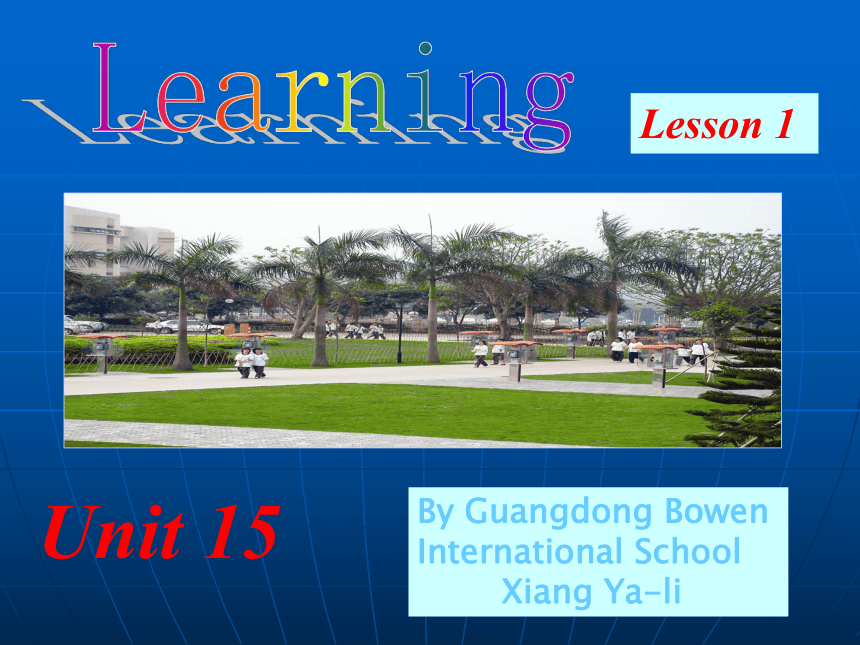
|
|
| 格式 | zip | ||
| 文件大小 | 2.5MB | ||
| 资源类型 | 教案 | ||
| 版本资源 | 北师大版 | ||
| 科目 | 英语 | ||
| 更新时间 | 2013-12-19 00:00:00 | ||
图片预览

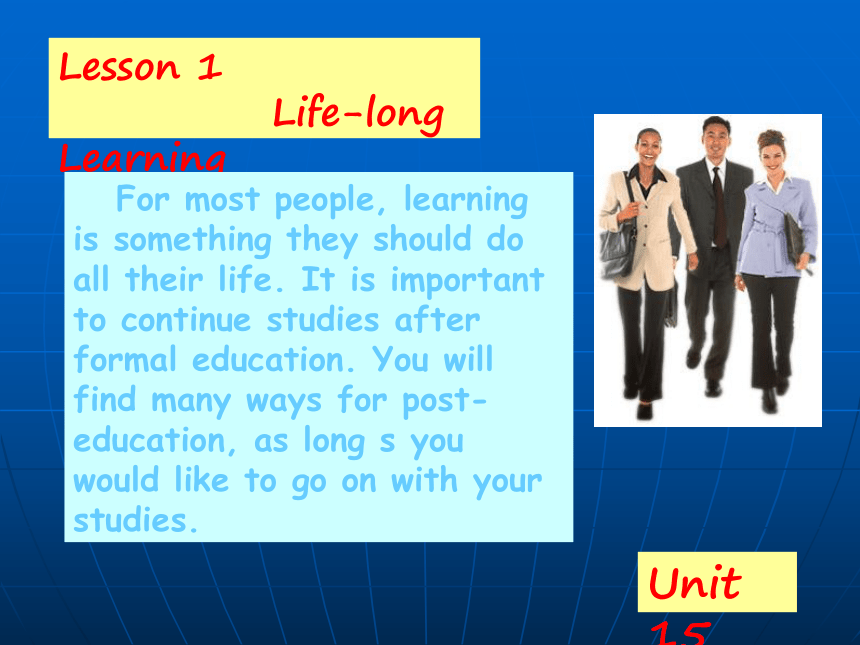
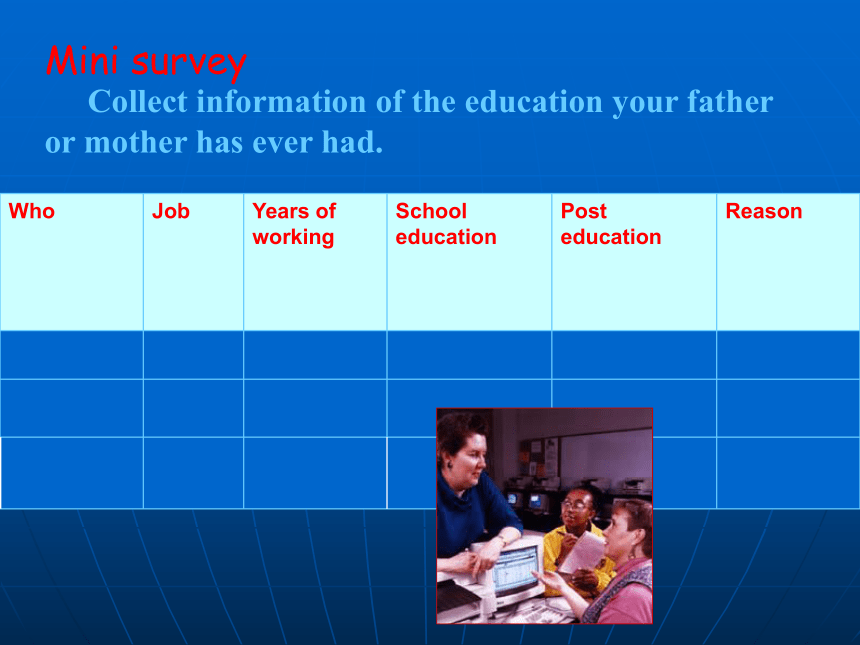
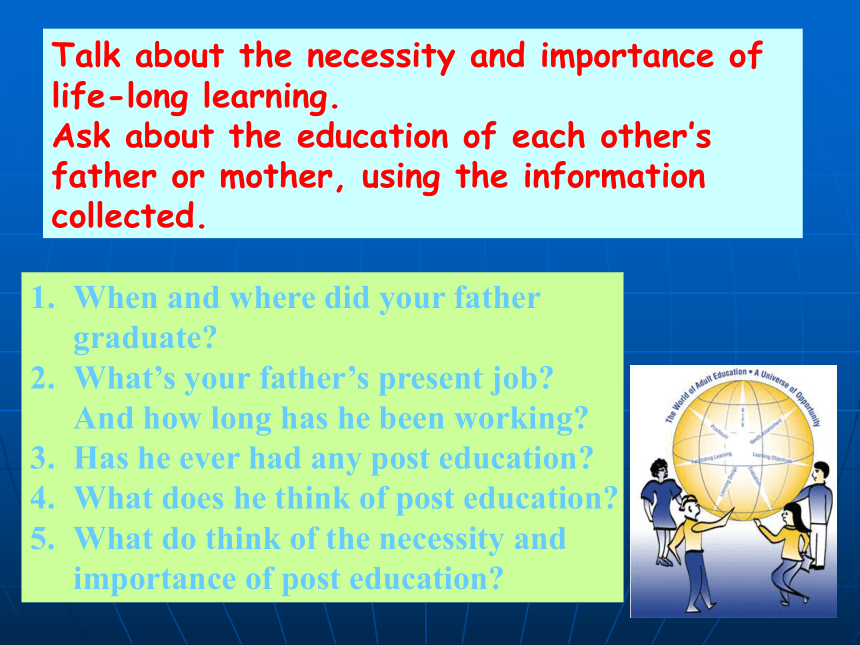
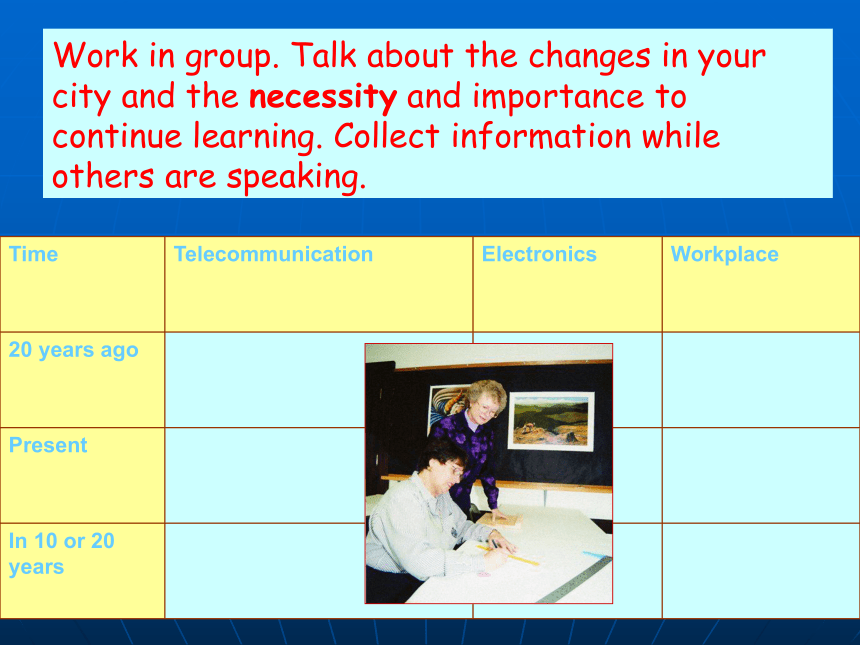
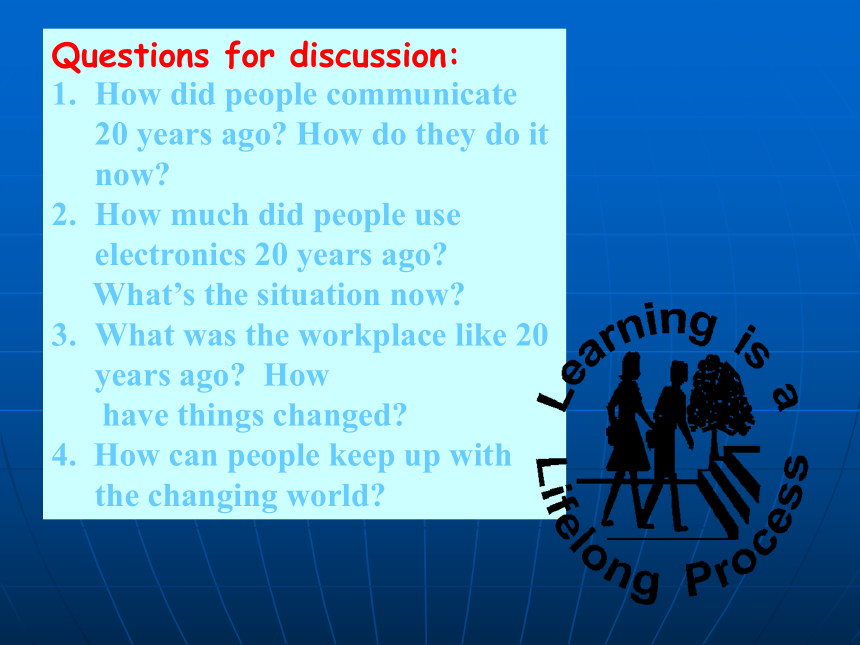
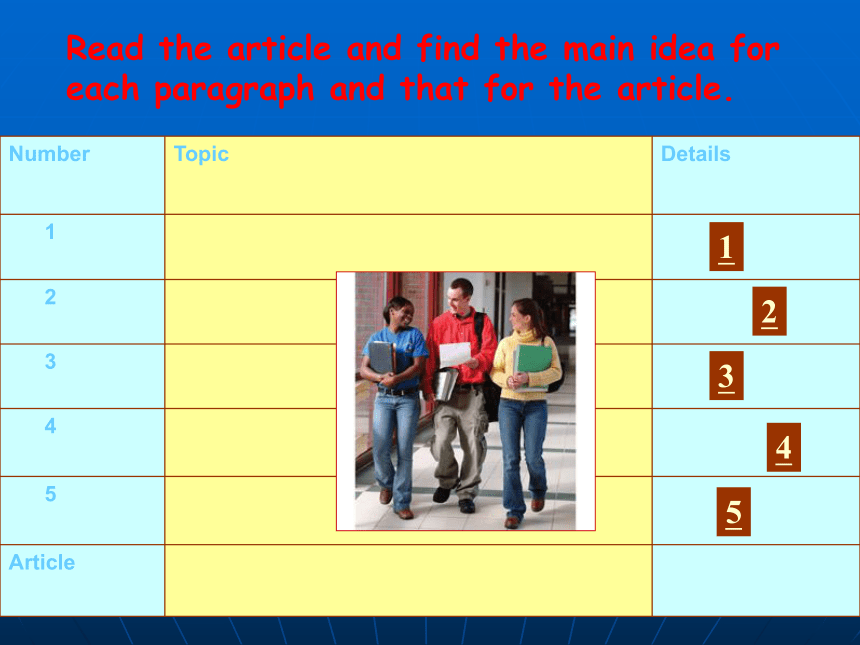
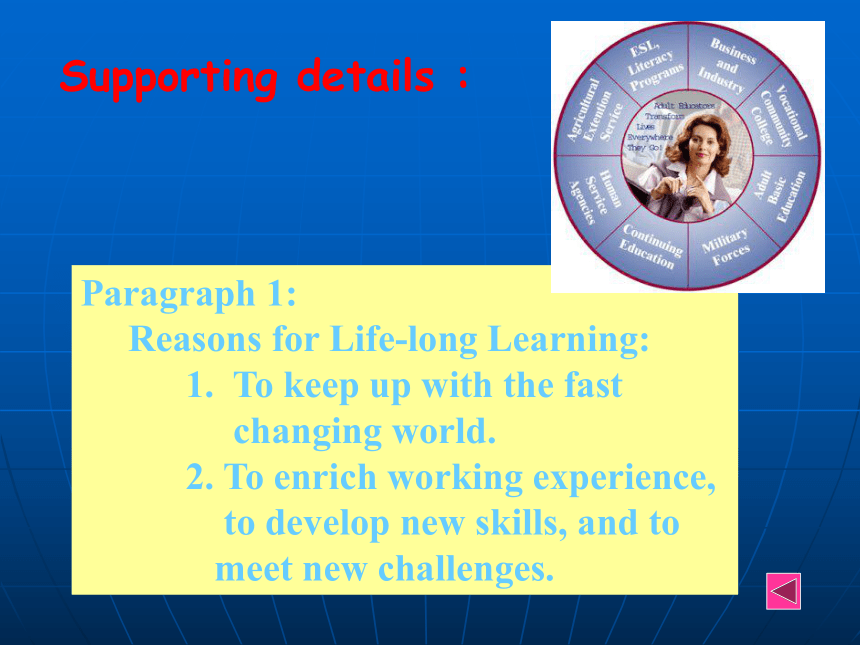
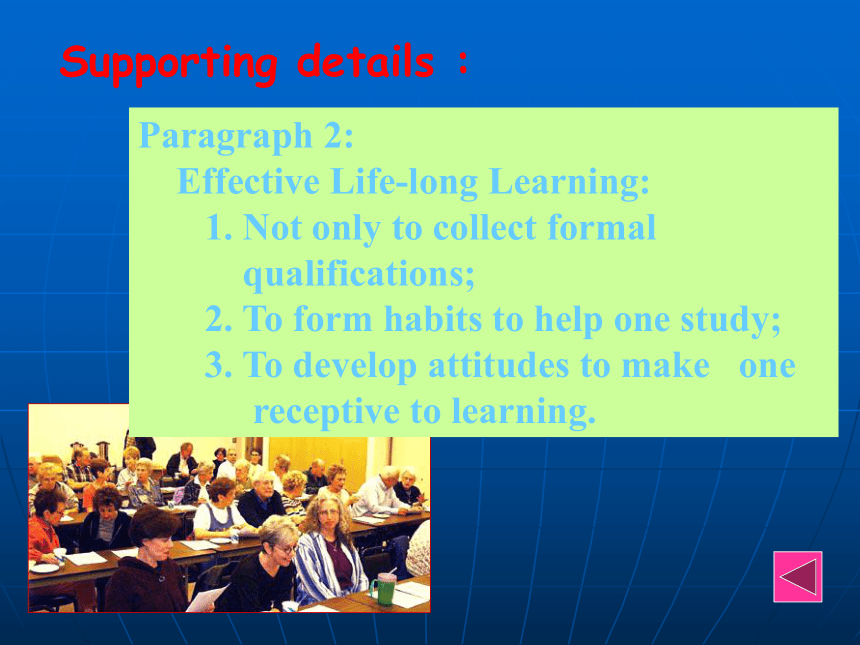
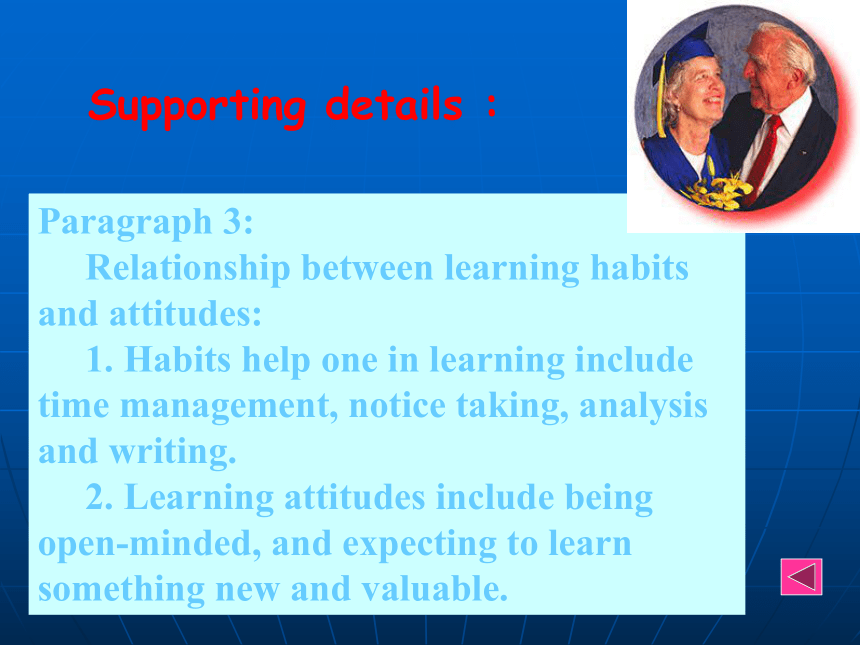
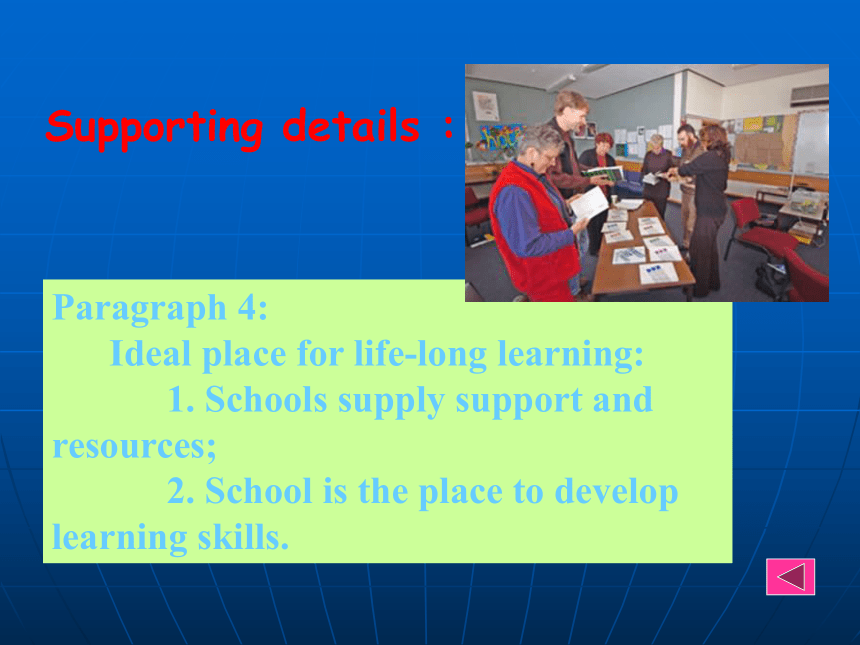
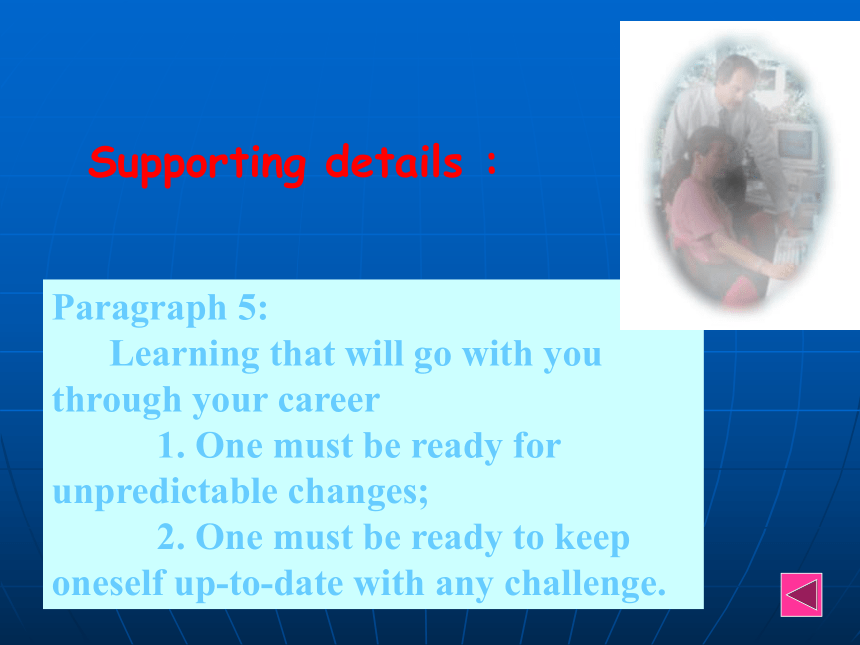
文档简介
课件31张PPT。Unit 15 LearningLesson 1By Guangdong Bowen International School
Xiang Ya-liUnit 15Lesson 1
Life-long Learning For most people, learning is something they should do all their life. It is important to continue studies after formal education. You will find many ways for post- education, as long s you would like to go on with your studies.Mini survey
Collect information of the education your father or mother has ever had.Talk about the necessity and importance of life-long learning.
Ask about the education of each other’s father or mother, using the information collected.When and where did your father graduate?
What’s your father’s present job? And how long has he been working?
Has he ever had any post education?
What does he think of post education?
What do think of the necessity and importance of post education?Work in group. Talk about the changes in your city and the necessity and importance to continue learning. Collect information while others are speaking.Questions for discussion:
How did people communicate 20 years ago? How do they do it now?
How much did people use electronics 20 years ago?
What’s the situation now?
What was the workplace like 20 years ago? How
have things changed?
4. How can people keep up with the changing world?Read the article and find the main idea for each paragraph and that for the article.12345Supporting details :Paragraph 1:
Reasons for Life-long Learning:
1. To keep up with the fast
changing world.
2. To enrich working experience,
to develop new skills, and to
meet new challenges.Supporting details :Paragraph 2:
Effective Life-long Learning:
1. Not only to collect formal
qualifications;
2. To form habits to help one study;
3. To develop attitudes to make one
receptive to learning.Supporting details :Paragraph 3:
Relationship between learning habits and attitudes:
1. Habits help one in learning include time management, notice taking, analysis and writing.
2. Learning attitudes include being open-minded, and expecting to learn something new and valuable.Supporting details :Paragraph 4:
Ideal place for life-long learning:
1. Schools supply support and resources;
2. School is the place to develop learning skills.Supporting details :Paragraph 5:
Learning that will go with you through your career
1. One must be ready for unpredictable changes;
2. One must be ready to keep oneself up-to-date with any challenge.Reread the article and answer the questions according to it, using the information you have collected.What are the major differences between the work and study of today compared to 20 years ago?
Why is life-long learning so important for people today?
What is life-long learning for and why is it important to be a life-long learner?
What do you need to be a good life-long learner?
What do you need to do today to prepare yourself to be a life-long learner?Differences between work and study today compared to 20 years agoWorked in the
same jobA special skill or professionChanging jobLearn new thingsLearn to enrich work experience, develop new skills1. 20 years ago, people worked in the same job from graduation till retirement, so they learned a special skill for the job. But today, in order to keep up with the fast changing world people have to continue their study all their life.2. Today, jobs are changing and developing so fast that if you don’t continue your study, you will fall behind the competitive job markets.3. Life-long learning enable you to be ready for the unpredicted change and to develop your skills to meet one and another challenge in your career, so you should be a life-long learner to keep the fast changing world.4. To be a life-long learner, you should form the habits to help you study and develop attitudes to make you receptive to learning.5. To be a life-long learner, one needs to develop learning skills and learn how to learn.Test your memory:
Put in the missing words according to the article. Today you cannot ________ that completing a course will give you ______________ that will see you through your career. Change is _____________ and you must be ready for it. In fact, there is no profession that doesn't ______ constant learning. But this is not something to be ______ of. All you need to do is to _______ learning skills and learn how to learn so that you are ready to keep yourself ____________with any changes that come your way. Be ______________, have the right __________, and be ready for the next __________.assumequalificationsunpredictablerequirescareddevelopup-to-dateopen-mindedattitudechallengeWhat do they mean? Read the article again and guess the meaning of the words and expressions.
Look them up in the dictionary to see if you are right. Constantly From time to time Aim Enrich Competitive Commit oneself to Qualification
Receptive to Ideal Invest time in doing Assume See . . . through Be scared of Constantly : continuously
One should learn constantly in order to keep up with the fast changing world.2. From time to time : occasionally, once in a time, sometimes
While I was in New York, some friends of mine visited me from time to time.3. Aim (v): have an aim
We aim to make greater contributions to our country.4. Enrich : make richer
Reading widely can enrich our knowledge.5. Competitive
Liking competition or inclined to compete
Keep on learning, or you fall behind the competitive job market.6. Commit oneself to
devote oneself to
Many adults commit themselves to life-long learning.7. Qualification
A quality, an ability, or an accomplishment that makes a person suitable for a particular position or task.8. Receptive to
Ready or willing to receive favorably
receptive to their proposals9. Ideal
A conception of something in its absolute perfection.
ideal job10. Invest …in …
To spend or devote for future advantage or benefit:
invested much time and energy in getting a good education.11. Assume
To take upon oneself:
assume responsibility; assume another's debts.12. See . . . through
To understand the true character or nature of:
We saw through his superficial charm.13. Be scared of : be afraid of
Don’t be scared of any difficulty. Grammar: Third conditionalListen to the first part of an interview. Collect information about their life-long learning experiences.Listen to the the second part of the interview, and complete the conditional sentences.Work in pair and make up more sentences.Assignment
Interview a person in an important position, such as a manager, a headmaster of a school, a doctor, etc, about their post education and write a passage about life-long learning.
Xiang Ya-liUnit 15Lesson 1
Life-long Learning For most people, learning is something they should do all their life. It is important to continue studies after formal education. You will find many ways for post- education, as long s you would like to go on with your studies.Mini survey
Collect information of the education your father or mother has ever had.Talk about the necessity and importance of life-long learning.
Ask about the education of each other’s father or mother, using the information collected.When and where did your father graduate?
What’s your father’s present job? And how long has he been working?
Has he ever had any post education?
What does he think of post education?
What do think of the necessity and importance of post education?Work in group. Talk about the changes in your city and the necessity and importance to continue learning. Collect information while others are speaking.Questions for discussion:
How did people communicate 20 years ago? How do they do it now?
How much did people use electronics 20 years ago?
What’s the situation now?
What was the workplace like 20 years ago? How
have things changed?
4. How can people keep up with the changing world?Read the article and find the main idea for each paragraph and that for the article.12345Supporting details :Paragraph 1:
Reasons for Life-long Learning:
1. To keep up with the fast
changing world.
2. To enrich working experience,
to develop new skills, and to
meet new challenges.Supporting details :Paragraph 2:
Effective Life-long Learning:
1. Not only to collect formal
qualifications;
2. To form habits to help one study;
3. To develop attitudes to make one
receptive to learning.Supporting details :Paragraph 3:
Relationship between learning habits and attitudes:
1. Habits help one in learning include time management, notice taking, analysis and writing.
2. Learning attitudes include being open-minded, and expecting to learn something new and valuable.Supporting details :Paragraph 4:
Ideal place for life-long learning:
1. Schools supply support and resources;
2. School is the place to develop learning skills.Supporting details :Paragraph 5:
Learning that will go with you through your career
1. One must be ready for unpredictable changes;
2. One must be ready to keep oneself up-to-date with any challenge.Reread the article and answer the questions according to it, using the information you have collected.What are the major differences between the work and study of today compared to 20 years ago?
Why is life-long learning so important for people today?
What is life-long learning for and why is it important to be a life-long learner?
What do you need to be a good life-long learner?
What do you need to do today to prepare yourself to be a life-long learner?Differences between work and study today compared to 20 years agoWorked in the
same jobA special skill or professionChanging jobLearn new thingsLearn to enrich work experience, develop new skills1. 20 years ago, people worked in the same job from graduation till retirement, so they learned a special skill for the job. But today, in order to keep up with the fast changing world people have to continue their study all their life.2. Today, jobs are changing and developing so fast that if you don’t continue your study, you will fall behind the competitive job markets.3. Life-long learning enable you to be ready for the unpredicted change and to develop your skills to meet one and another challenge in your career, so you should be a life-long learner to keep the fast changing world.4. To be a life-long learner, you should form the habits to help you study and develop attitudes to make you receptive to learning.5. To be a life-long learner, one needs to develop learning skills and learn how to learn.Test your memory:
Put in the missing words according to the article. Today you cannot ________ that completing a course will give you ______________ that will see you through your career. Change is _____________ and you must be ready for it. In fact, there is no profession that doesn't ______ constant learning. But this is not something to be ______ of. All you need to do is to _______ learning skills and learn how to learn so that you are ready to keep yourself ____________with any changes that come your way. Be ______________, have the right __________, and be ready for the next __________.assumequalificationsunpredictablerequirescareddevelopup-to-dateopen-mindedattitudechallengeWhat do they mean? Read the article again and guess the meaning of the words and expressions.
Look them up in the dictionary to see if you are right. Constantly From time to time Aim Enrich Competitive Commit oneself to Qualification
Receptive to Ideal Invest time in doing Assume See . . . through Be scared of Constantly : continuously
One should learn constantly in order to keep up with the fast changing world.2. From time to time : occasionally, once in a time, sometimes
While I was in New York, some friends of mine visited me from time to time.3. Aim (v): have an aim
We aim to make greater contributions to our country.4. Enrich : make richer
Reading widely can enrich our knowledge.5. Competitive
Liking competition or inclined to compete
Keep on learning, or you fall behind the competitive job market.6. Commit oneself to
devote oneself to
Many adults commit themselves to life-long learning.7. Qualification
A quality, an ability, or an accomplishment that makes a person suitable for a particular position or task.8. Receptive to
Ready or willing to receive favorably
receptive to their proposals9. Ideal
A conception of something in its absolute perfection.
ideal job10. Invest …in …
To spend or devote for future advantage or benefit:
invested much time and energy in getting a good education.11. Assume
To take upon oneself:
assume responsibility; assume another's debts.12. See . . . through
To understand the true character or nature of:
We saw through his superficial charm.13. Be scared of : be afraid of
Don’t be scared of any difficulty. Grammar: Third conditionalListen to the first part of an interview. Collect information about their life-long learning experiences.Listen to the the second part of the interview, and complete the conditional sentences.Work in pair and make up more sentences.Assignment
Interview a person in an important position, such as a manager, a headmaster of a school, a doctor, etc, about their post education and write a passage about life-long learning.
